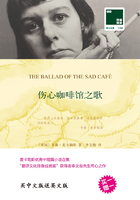An Adventure on Island Rock
露西·莫德·蒙哥马利 / Lucy Maud Montgomery
露西·莫德·蒙哥马利(Lucy Maud Montgomery,1874—1942),加拿大作家。露西是个才华横溢的多产作家,创作了500多篇短篇故事、诗和小说,其中最著名的作品《清秀佳人》让她一举成名。
"Who was the man I saw talking to you in the hayfield? " asked Aunt Kate, as Uncle Richard came to dinner.
"Bob Marks, " said Uncle Richard briefly. "I' ve sold Laddie to him."
Ernest Hughes, the twelve-year-old orphan boy whom Uncle "boarded and kept" for the chores he did, suddenly stopped eating.
"Oh, Mr. Lawson, you' re not going to sell Laddie! " he cried chokely.
Uncle Richard stared at him. Never before, in the five years that Ernest had lived with him, had the quiet little fellow spoken without being spoken to, much less ventured to protest against anything Uncle Richard might do.
"Certainly I am. " answered the latter curtly. "Bob offered me twenty dollars for the dog, and he' s coming after him next week."
"Oh, Mr. Lawson, " said Ernest, rising to his feet, his small, freckled face crimson. "Oh, don' t sell Laddie! Please, Mr. Lawson, don' t sell him! "
"What nonsense is this? " said Uncle Richard sharply. He was a man who brooked no opposition from anybody, and who never changed his mind when it was once made up.
"Don' t sell Laddie! " pleaded Ernest miserably. "He is the only friend I have got. I can' t live if Laddie goes away. Oh, don't sell him, Mr. Lawson! "
"Sit down and hold your tongue. " said Uncle Richard sternly. "The dog is mine, and I shall do with him as I think fit. He is sold, and that is all there is about it. Go on with your dinner."
But Ernest for the first time did not obey. He snatched his cap from the back of his chair, dashed it down over his eyes, and ran from the kitchen with a sob choking his breath. Uncle Richard looked angry, but Aunt Kate hastened to soothe him.
"Don' t be vexed with the boy, Richard, " she said. "You know he is very fond of Laddie. He' s had to do with him ever since he was a pup, and no doubt he feels badly at the thought of losing him. I' m rather sorry myself that you have sold the dog."
"Well, he is sold and there' s an end of it. I don' t say but that the dog is a good dog. But he is of no use to us, and twenty dollars will come in mighty handy just now. He' s worth that to Bob, for he is a good watch dog, so we' ve both made a fair bargain."
Nothing more was said about Ernest or Laddie. I had taken no part in the discussion, for I felt no great interest in the matter. Laddie was a nice dog; Ernest was a quiet, inoffensive little fellow, five years younger than myself; that was all I thought about either of them.
I was spending my vacation at Uncle Richard' s farm on the Nova Scotian Bay of Fundy shore. I was a great favourite with Uncle Richard, partly because he had been much attached to my mother, his only sister, partly because of my strong resemblance to his only son, who had died several years before. Uncle Richard was a stern, undemonstrative man, but I knew that he entertained a deep and real affection for me, and I always enjoyed my vacation sojourns at his place.
"What are you going to do this afternoon, Ned? " he asked, after the disturbance caused by Ernest' s outbreak had quieted down.
"I think I' ll row out to Island Rock, " I replied. "I want to take some views of the shore from it."
Uncle Richard nodded. He was much interested in my new camera.
"If you' re on it about four o' clock, you' ll get a fine view of the ' Hole in the Wall' when the sun begins to shine on the water through it, " he said. "I' ve often thought it would make a handsome picture."
"After I' ve finished taking the pictures, I think I' ll go down shore to Uncle Adam' s and stay all night, " I said. "Jim' s dark room is more convenient than mine, and he has some pictures he is going to develop tonight, too."
I started for the shore about two o' clock. Ernest was sitting on the woodpile as I passed through the yard, with his arms about Laddie' s neck and his face buried in Laddie' s curly hair. Laddie was a handsome and intelligent black-and-white Newfoundland, with a magnificent coat. He and Ernest were great chums. I felt sorry for the boy who was to lose his pet.
"Don' t take it so hard, Ern, " I said, trying to comfort him. "Uncle will likely get another pup."
"I don' t want any other pup! " Ernest blurted out. "Oh, Ned, won' t you try and coax your uncle not to sell him? Perhaps he'd listen to you."
I shook my head. I knew Uncle Richard too well to hope that.
"Not in this case, Ern, " I said. "He would say it did not concern me, and you know nothing moves him when he determines on a thing. You' ll have to reconcile yourself to losing Laddie, I' m afraid."
Ernest' s tow-coloured head went down on Laddie' s neck again, and I, deciding that there was no use in saying anything more, proceeded towards the shore, which was about a mile from Uncle Richard' s house. The beach along his farm and for several farms along shore was a lonely, untenanted one, for the fisher-folk all lived two miles further down, at Rowley's Cove. About three hundred yards from the shore was the peculiar formation known as Island Rock. This was a large rock that stood abruptly up out of the water. Below, about the usual water-line, it was seamed and fissured, but its summit rose up in a narrow, flat-topped peak. At low tide twenty feet of it was above water, but at high tide it was six feet and often more under water.
I pushed Uncle Richard' s small flat down the rough path and rowed out to Island Rock. Arriving there, I thrust the painter deep into a narrow cleft. This was the usual way of mooring it, and no doubt of its safety occurred to me.















